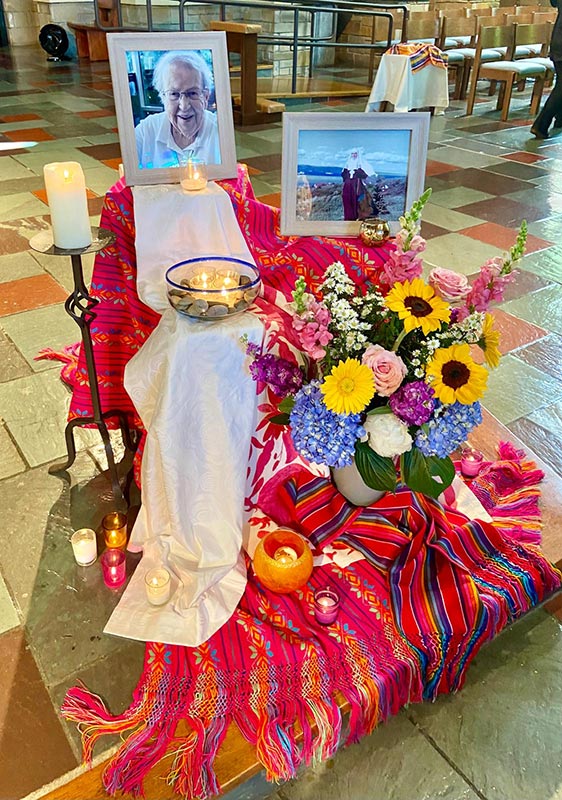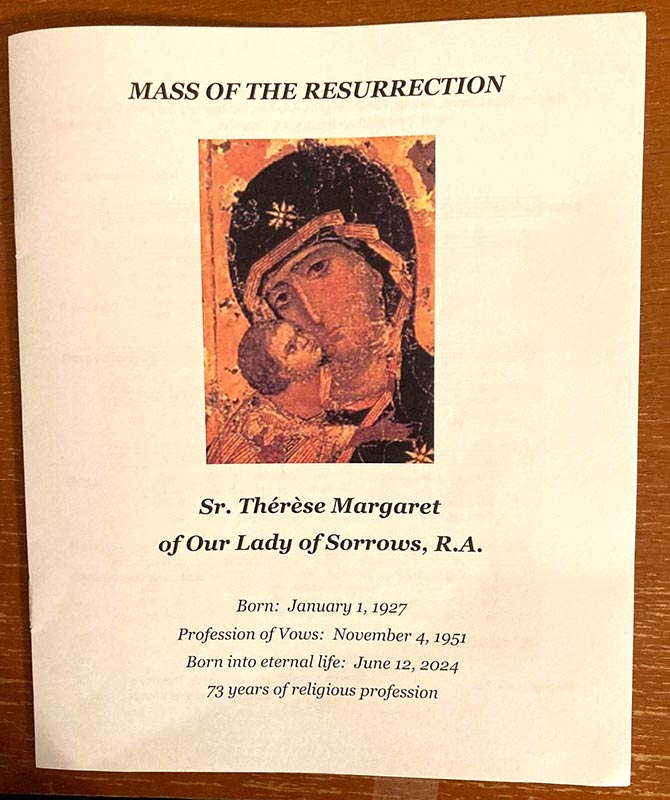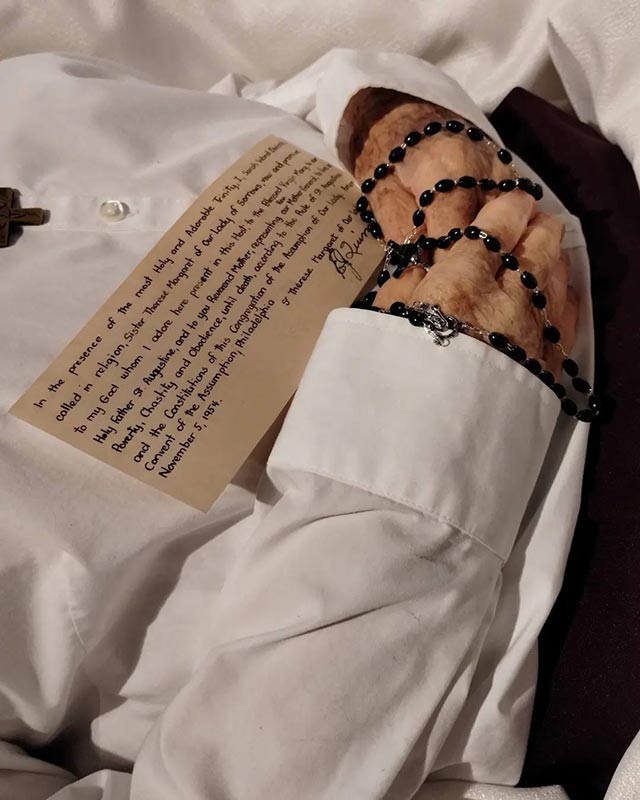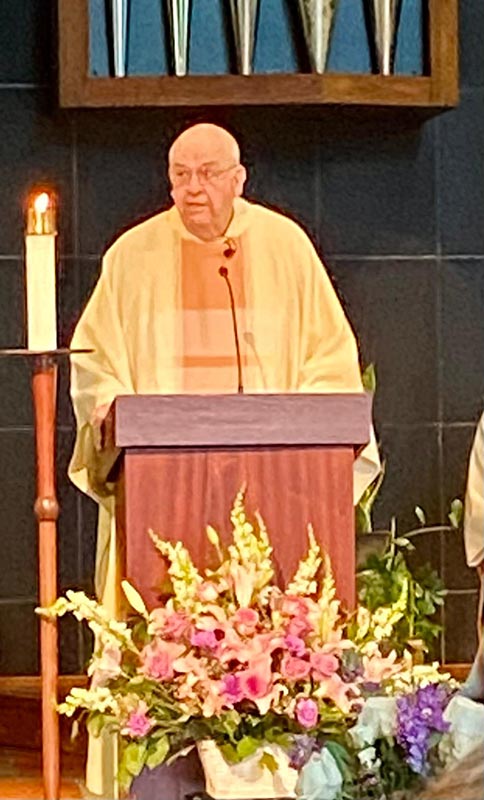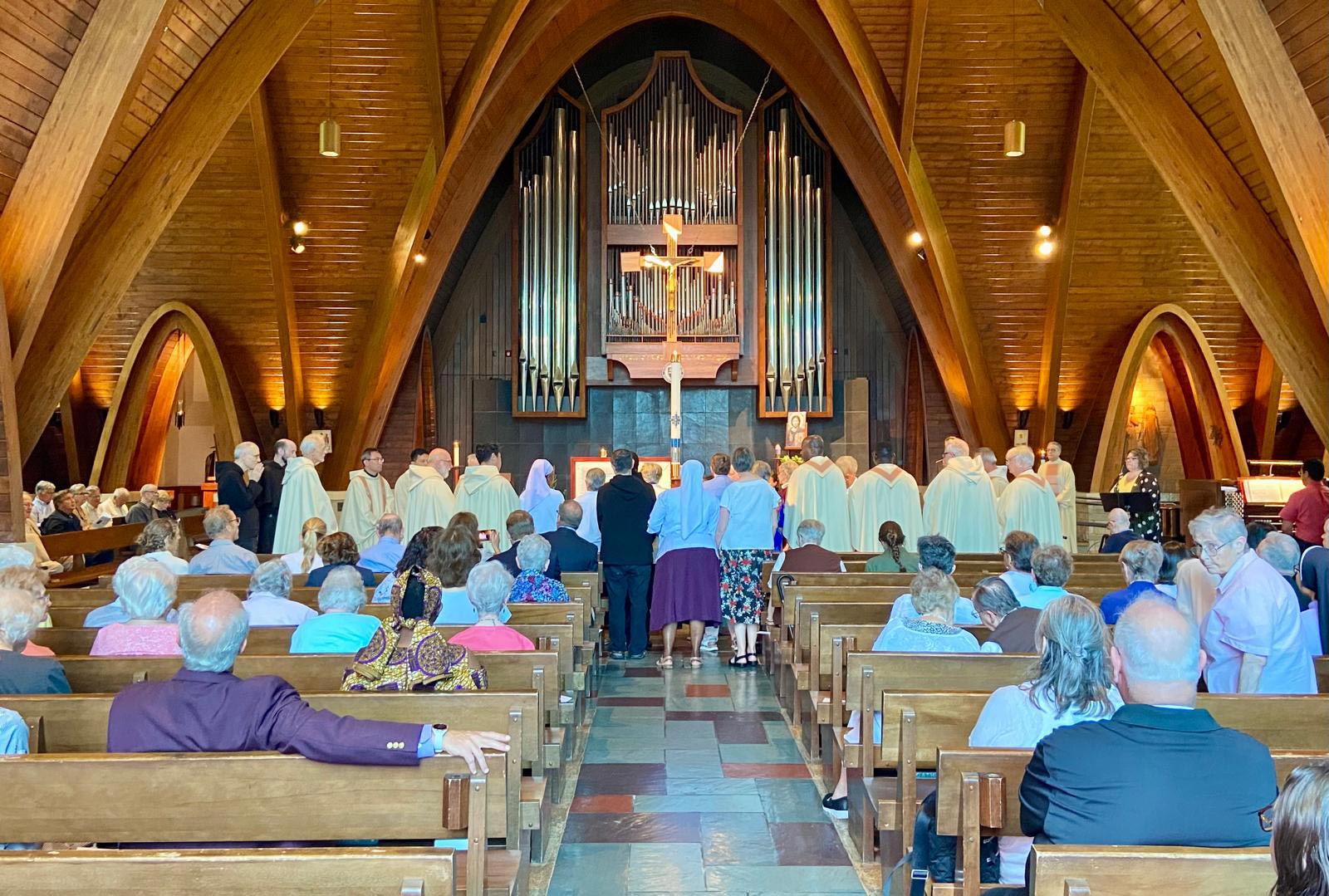Chapel of the Holy Spirit, Assumption University
Friday, June 21, 2024
Scripture readings: Micah, 6:6-8; Psalm 92; Galatians 2:15-16, 19-20; Matthew, 5:1-12a
When news went out about Therese’s death last week, our friend and neighbor Fred Bayon told a story that he had filed away in his memory bank. It goes back to Therese’s high school days at Ravenhill in Philadelphia and, get this, her striking Grace Kelly with her field hockey stick. (As these stories get magnified in the transmission, one version had her bopping Grace over the head with the stick). The thought of it was funny enough, but then I got to thinking about many years later when Fred was Chair of the Board here and Therese a member of the Board would make one of her soft-spoken interventions, and Fred’s thinking, this is the same girl that chopped Grace Kelly with her stick.
So whatever nice things we say about Therese, you might keep this in mind. She was not all sweetness and light.
Now to begin the more solemn part of this homily, Sister Therese would be so pleased to see all of you in the Chapel this morning, here to honor Therese’s life and to pray for her soul. The RA’s themselves have had a very tough couple of weeks with the death of two sisters who have been such a vital part of this province for so many years. I think you know, Sisters, that we want to stand by you and lend whatever support we can at this difficult moment.
For many years, Sister Therese has been the beating heart of the Worcester community, so the stopping of that heart is felt as a tremendous loss. Hers was a kind heart, a welcoming heart, a tender heart, an affirming heart. As Sister Mary Ann said last night, she attended to others – to her sisters with whom she shared life and to so many others who were connected to the life of the community. But also, in these last years especially, she allowed herself to be attended to. There’s a great simplicity in that. Those two things taken together, the care she had for us and the care she was able to receive, were expressive of a humanity which was really attractive, beautifully attractive. This is what made her such a good sister, a good companion, and a good friend. She had a gift for communicating to you that it is important that you exist. That was her affirming heart and it was really special. I invite you to take hold of the photo on the memorial card or at the back of your leaflet and look at that smile. It gives this all away.
Last week at the house when I saw the deep grieving of Bea and Vicky and Fung, I was reminded of the number of sisters from different parts of the world who came to find a home at Otsego Road or Old English Road. Therese was such an important part of that mix and this was evident right to the end. Her death must have reverberated in a number of places in the Assumption world.
So where did this come from? What made Therese the person she became? Once she got over her embarrassment in even being asked the question, how would Therese have responded?
It was certainly not from living a charmed life, free of suffering. (I’m not sure what that would look like.) Therese had her struggles, she suffered. I always sensed that this was somehow etched into her very being. St. Marie Eugenie wrote to her Sisters that the life of the Church must be formed in us through suffering. I’ll leave it at saying that Therese is to be numbered among those suffering members who give life to the Church.
I do think the best place to find an answer to be found in the readings that the Sisters chose for today’s Mass. They are really wonderful readings. The prophet Micah, what is it that the Lord requires but to do justice, to love kindness and to walk humbly with your God. The kindness and humility are so much part of who Therese was, but I might propose that all three of them are essential for the building up of community. And that’s not a bad way of seeing how Therese saw her mission as a consecrated religious: to participate in the building up of community. As for doing justice, one thinks of her many contributions to the life of the Cana community, to the Assumption Missionaries and to the wider efforts at education and community-building in the Main South neighborhood. Therese had a warm and justice-inspired heart for those in need. And if we needed anything else, Monsignor Scollen’s presence here is a reminder of this great work.
Therese loved to bring people together and to be part of groups that were brought together. (Leaving aside any untoward associations, she was something of a party animal.) Besides her knitting group at the Assumption Center, how many reading groups did she belong to over the years? Marie Eugenie encourages her sisters “to make the mind as Christian as the heart” – this is how she puts it – and Therese’s inquiring mind and her desire to keep learning were right there on that. One personal example of this – and I say it as just one of many – is what I call our Erasmo Leiva-Merikakis moment. (I bet you never had one of those.) I happened to land upon Merikakis’s stunningly beautiful four volume commentary on St. Matthew’s Gospel, written in the form of lectio divina I recommended it to Therese, and she spoke of it to Frank McGuire, and the oral tradition – the passing on of what you love – was fully set in motion. Therese should have gotten royalties for all the books she recommended to her friends.
I think we get closest to what is foundational in Therese’s life by looking at St. Paul’s words in our second reading this morning – which by the way Therese took as her “Word” at her profession of vows. Paul says, “this life that I now live in the body, I live in the Son of God, who loved me and gave himself for me. In the preceding verse, he writes “I no longer live, but Christ lives in me.” Throughout her long life, Therese allowed herself to be incorporated into the dynamic of the Christian life, that logic of receiving and giving – receiving everything that we are and have from God and giving it freely and generously to others. She knew that she was loved by God, the God who handed himself over for us, who became poor for our sake, so that we might learn how to love as God loves. Close to her own death, Marie Eugenie wrote to her sisters, “I am looking at my Lord. It is in looking at Him that we learn how to love.” In this regard, I always think of the practice of daily adoration in the Sisters’ Rule, and how much that served to orient Therese’s life.
As for the Beatitudes, let me ask this. If you were to choose the Gospel passage that befits Therese’s life, I’d place my bet on many of saying , “ah yes, the Beatitudes.” I’d suggest that we read the Beatitudes and their application to Therese in light of St. Paul’s words. The Beatitudes are not so much aspirational, something that we strive for, as much as they are the fruit of our being formed into Christ. Christ is the poor one, the merciful one, the peace-maker, and it is to the extent that our life is conformed to his that we ourselves acquire these dispositions. This is at the heart of the Sisters’ Rule and so much of it shone through in Therese.
Now, a word about Therese’s death…
I read a book 30 years ago by a physician, Sherwin Nuland, called How We Die. It’s an interesting read, though I wouldn’t recommend it for summer at the beach. The first line in the book, if I remember correctly, was “Nobody dies well.” I want to say to Nuland, he was known by Shep …. “Shep, I beg your pardon…”
So let’s re-visit this, one more time. Therese was able to come home to her sisters after being hospitalized for a heart attack. Many of us received a photo of her sitting in the living room, looking rather like herself and being lovingly attended to. For evening prayer, the sisters decided to accommodate her by praying in the living room instead of the oratory. As they shared the reading of the psalms, when it was her turn, Therese prayed these words from Psalm 62:
God alone is my rock and my salvation, my fortress, I shall not fall. My deliverance and honor are with God, my strong rock, my refuge is with God.
Immediately after praying these words, she breathed her last breath.
In his announcement to the campus community, Deacon Paul mentioned how appropriate this was. With all due respect, Paul, I think appropriate is too mild a word. It was perfect. Perfect. Pardon the terrible pun, but it was breath-taking in its appropriateness. It was a transparent sign of an integrated life, a life given full and final expression at that last moment.
….One caveat. If we were to give Therese something of the last word, she would say, I’m sure, there was a lot left un-integrated in my life. We’ll take her word on that. She may not be quite ready for Cooperstown (Nuala can help with the metaphor). But that’s one of the reasons we’re here, to pray for God’s mercy, wherever it is needed. But we’re also here to thank God for the witness of a life lived to the fullness of her days, and to thank God for how much his love was communicated to us through her.
